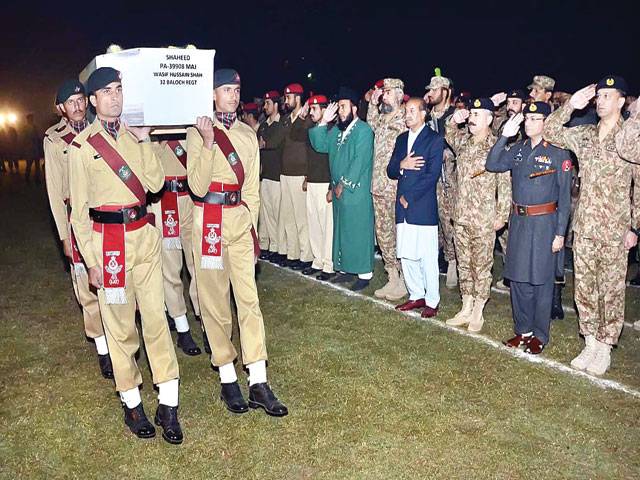MIRANSHAH - Airstrikes and ground clashes between security forces and militants in North Waziristan Agency early Sunday left four soldiers, including an army major, and 34 militants dead.
The fresh fighting came a day after top military commander in the region claimed that 90 percent of North Waziristan Agency has been cleared.
Four soldiers were killed and at least eight were missing after insurgents using rockets and grenades stormed a checkpoint in the remote border region of North Waziristan Agency, security sources said.
The military launched an operation to push the Taliban out of North Waziristan, their key stronghold, in June. Bases there were used by a variety of insurgent groups to stage deadly attacks in both Afghanistan and Pakistan.
Three military sources, who asked not to be identified, said a major was among those killed in the attack. Eleven men were wounded and between eight and 10 were missing, they said.
A curfew had been imposed in Datta Khel, where the attack took place, and soldiers were combing the area around the Spara Gher checkpoint for their missing comrades, the sources said.
The Taliban have captured soldiers in the past. Sometimes they have been released or have escaped. In 2012, the Islamist group beheaded 17 soldiers and posted a video of the killings on the Internet.
“During a search operation seven terrorists were killed in Datta Khel. Four soldiers including an officer also embraced martyrdom,” a military statement said. Four soldiers were wounded in an exchange of fire, it added.
A security official also confirmed the incident but told AFP that the number wounded in the attack was greater - estimating at least 11 soldiers were injured.
Ahmadullah Ahmadi, a spokesman for militant commander Hafiz Gul Bahadur, claimed responsibility for the attack. Bahadur, a prominent local warlord once seen as “pro-Pakistani”, is reportedly unhappy with the military offensive in North Waziristan Agency.
“We carried out this attack because the army has established new check posts here,” Ahmadi in a telephone call told AFP.
A separate military statement said Pakistan Air Force (PAF) jets bombed insurgent hideouts in Datta Khel on Sunday, killing 27 militants. “In precise aerial strikes, 27 terrorists including some of their important commanders and foreigners were killed in Datta Khel,” it said. Security officials have described the village as a stronghold of insurgent groups.
It is 40 kilometres west of Miranshah, the main town in North Waziristan. Pakistan’s semi-autonomous areas have long been a hideout for militants of all stripes - including Al-Qaeda and the homegrown Tehreek-e-Taliban Pakistan (TTP) as well as foreign fighters such as Uzbeks and Uighurs. It was not possible to independently verify the casualties as media are banned from the area.
Pakistani jets and artillery began targetting rebel strongholds in North Waziristan in mid-June and ground forces moved in on June 30. The army says it has killed more than 1,200 militants and lost more than 100 soldiers since the start of the operation. An AFP tally based on regular updates from the military puts the militant death toll at nearly 1,500, with 124 soldiers killed.
The military operation followed months of futile attempts to hold peace talks between the new government of Nawaz Sharif and the insurgents.
The area is closed to journalists unless they travel with the military and most of the civilian residents - around a million people - were also ordered to leave their homes until the offensive is over.
On Saturday, Major General Zafarullah Khan, the officer in charge of North Waziristan, said that a widely-predicted wave of violence in response to the Zarb-e-Azb had failed to materialise. “The action which was expected has not come,” he said
He said 90 percent of the agency has been cleared of militants.
Many of the areas the military moved into had been booby trapped, Khan said, and soldiers were going house to house to defuse bombs. “They have planted (them) in houses, they have planted (them) in the streets, they’ve planted (them) even in the trees,” he said.
Tuesday, November 26, 2024
Army major killed in Waziristan clash
| Three more soldiers martyred, 8 missing in checkpost attack | 34 militants dead in air blitz, fighting

10:19 AM | November 26, 2024
Over 20,000 applications received for Government Hajj Scheme 2024
12:02 PM | November 26, 2024
Trump vows tariffs on China, Canada and Mexico over fentanyl, immigration
11:52 AM | November 26, 2024
US urges peaceful protests, respect for human rights in Pakistan
11:41 AM | November 26, 2024
Unemployed husband kills wife over her success
November 26, 2024
Ombudsperson stresses need to tackle harassment cases
November 26, 2024
-
Gallup survey: 47pc of Pakistanis never used trains
-
Gallup survey: 47pc of Pakistanis never used trains
-
Digital nomadism redefines work and travel across the globe
-
Lahore tops global pollution rankings as smog worsens, AQI reaches hazardous levels
-
Hunger crisis to increase in South Sudan, warns UN
-
Pakistan’s judiciary champions climate justice at COP29 in Baku
Fixing PSDP
November 26, 2024
KP’s Failure
November 26, 2024
Invading Islamabad
November 26, 2024
Economic Imperative
November 25, 2024
Systematic Change
November 25, 2024
Smog War Between India and Pakistan
November 26, 2024
The Exodus of Talent
November 26, 2024
Exotic Food
November 25, 2024
Karachi Language Barrier
November 25, 2024
APSUS Report and Economic Challenges
November 25, 2024
ePaper - Nawaiwaqt
Nawaiwaqt Group | Copyright © 2024





